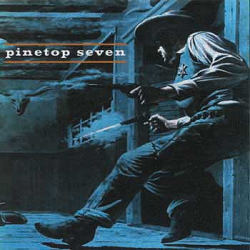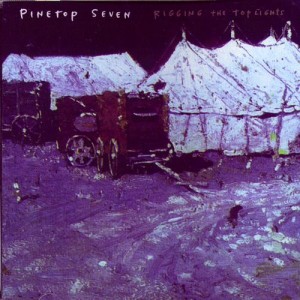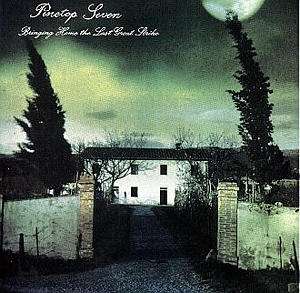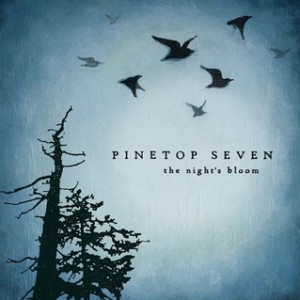Just figuring to mention it if you hadn’t noticed, the folk/Americana sound is pretty big right now. At least, a version of it is popular. As with so many things that linger in the public fascination, there are degrees of lineage, with those farthest from the bloodline seemingly being the most popular. The new folk/Americana strain finds three variants getting the most play: the earthy boy band that trades in the love-hate themes of just about any other boy band type, except that they don’t harmonize to synth beats. They play mandolins and acoustic guitars. There are also stars from other genres who, either with sincere intentions or not, are jumping on the bandwagon. The results, as can be surmised, are scattershot.
The third type was rather brilliantly summed up by Popdose’s own Ken Shane who said (paraphrasing), “It it were still the ’90s, they’d be a grunge band moaning about their pain. It’s the same self-pitying context, with different trappings.” So that’s why I find the situation that involved the band Pinetop Seven so disappointing. Coming up in the mid-’90s parallel to Calexico (but not associated with), Pinetop Seven released four studio albums and three collections of unused tracks, b-sides, and even the score of a silent movie they composed.
Now…pay attention. This is where things get interesting and if you don’t maintain your focus, you’ll miss something.
 Their material consisted primarily of vignettes of people on the edges of dark country places, and on the edges of their personal conceptions of morality. These were stories set to music, cast in the literary mold of a Flannery O’Connor, but the music was not cornpone and fiddlin’. It wasn’t all dobro and war-whoops. In fact, many times the overall sound could have been the cross-section of mournful hymn and ’60s baroque pop, not too far away from The Left Banke. Yet The Left Banke never recorded songs about the insidious plans of a traveling salesman on the naive daughters that cross his journeys (“Fringe” from The Night’s Bloom), the young boy who is captured by the beauty of the woman he just saw, incidentally, floating as a corpse in the water (“Finding The Lady In Kicking Horse Reservoir”), or of the woman who is coming to realize her ambitions have collapsed and is facing the distasteful prospect of giving it all up (“Money From Home” from the self-titled debut).
Their material consisted primarily of vignettes of people on the edges of dark country places, and on the edges of their personal conceptions of morality. These were stories set to music, cast in the literary mold of a Flannery O’Connor, but the music was not cornpone and fiddlin’. It wasn’t all dobro and war-whoops. In fact, many times the overall sound could have been the cross-section of mournful hymn and ’60s baroque pop, not too far away from The Left Banke. Yet The Left Banke never recorded songs about the insidious plans of a traveling salesman on the naive daughters that cross his journeys (“Fringe” from The Night’s Bloom), the young boy who is captured by the beauty of the woman he just saw, incidentally, floating as a corpse in the water (“Finding The Lady In Kicking Horse Reservoir”), or of the woman who is coming to realize her ambitions have collapsed and is facing the distasteful prospect of giving it all up (“Money From Home” from the self-titled debut).
Finding The Lady In Kicking Horse Reservoir
You might now say, well, isn’t that the same misery/murder ballad territory you were just decrying before? There is where the big distinction lies, and a clue is found in the band’s song publishing moniker, “Dark’s Pandemonium.” That is a literary reference to Ray Bradbury’s Something Wicked This Way Comes, where the carnival of sin and delight rolls into idyllic rural towns and exposes the dark hearts of townspeople, their souls claimed by carnival-keeper Mr. Dark. Though the group has been filled out by many talented people — Charles Kim, Ryan Hembry, Mack Hagood, John Peeler, Melissa Bach among them — it was always the vision of one man that unified this American gothic anthology, and that was vocalist and primary songwriter Darren Richard.
 There was no glamor about the band, and that may have been a contributing factor in their inability to catch on. The album art typically showed paintings and sketches of rural, folksy style. They didn’t have this all-encompassing mission, to make “simple songs about complicated lives,” although that very much constituted what they did. From Rigging The Toplights, the album that exemplified most what Pinetop Seven was capable of, the song “Drying Out” finds the singer bemoaning a hot, unrelenting summer that’s “not been kind” as he sits “by a bone-dry pool in a plastic chair.” It is never specifically pointed out what is drying out…the drought-stricken landscape, the pool, prospects and hopes, or even the individual voice singing. “Better off out here t’il I wrestle through a mess of mind (mine)” could be about finding one’s self looking back on how badly things got screwed up. Drying out could be about kicking alcohol addiction. It’s never spelled out in iron-clad terms and, therefore, gains a clarity for the individual listener to decide. What do you think is drying out?
There was no glamor about the band, and that may have been a contributing factor in their inability to catch on. The album art typically showed paintings and sketches of rural, folksy style. They didn’t have this all-encompassing mission, to make “simple songs about complicated lives,” although that very much constituted what they did. From Rigging The Toplights, the album that exemplified most what Pinetop Seven was capable of, the song “Drying Out” finds the singer bemoaning a hot, unrelenting summer that’s “not been kind” as he sits “by a bone-dry pool in a plastic chair.” It is never specifically pointed out what is drying out…the drought-stricken landscape, the pool, prospects and hopes, or even the individual voice singing. “Better off out here t’il I wrestle through a mess of mind (mine)” could be about finding one’s self looking back on how badly things got screwed up. Drying out could be about kicking alcohol addiction. It’s never spelled out in iron-clad terms and, therefore, gains a clarity for the individual listener to decide. What do you think is drying out?
In this and across the band’s discography, Richard’s voice is perfectly imperfect. Sometimes he reaches for a note that he doesn’t quite attain, but it never sounds off, atonal, or a waste of effort. The tonality matches the lyrics, and the overall tableau that is set before the listener. How weird would it have been if a perfect bell-like sound was singing about some of these topics?
For me, the unfairness comes in the fact that we are now experiencing a peak of popularity for acoustic-based music, leaning alongside the EDM, computer-assisted pop, and backbiting in-fighting of hip-hop/rap. Somehow a new audience for folk/Americana has emerged. I would love to think that, had Pinetop Seven debuted in 2010 instead of 1996, they would still be around. But even that might be an overreach from a biased perspective. Listen to these story-songs and you sense that even in this more willing climate, they’d be the odd-band-out. They never resorted to lyrics that were just lists about stuff that “makes America awesome” or “why my girl is awesome” or “why beer and trucks are awesome, but only occasionally at the same time.”
 Here’s why: a term that I absolutely hate is “resonate” because it is so often used by people with limited vocabularies as a stand-in for “something I agree with.” It’s a word that gets interchangeably tossed around when talking about why you like to watch Mad Men, or eat salads more than pork chops, or really dig Harleys. What it really means is the vibration that moves an object when struck, it courses through that entire object, often producing a tone, or perhaps a feeling. In order to feel that resonance, you must first be struck, and it needs to be a meaningful impact. When Richards engages in near-wordless harmonies on “The Palm Acres Parade” from Bringing Home The Last Great Strike, you don’t need to be told this is a funereal article. You feel it. It hits you, and it does so with the certainty of a ghost story without the false alarms and ginned-up shocks with boogeymen jumping from improbable corners. The plucked banjo and vibraphone are there to support the mood and not to call attention to itself. In the end, the track is like the soundtrack to a very old photograph, taken as the townspeople repatriate one of their own to the dust. It really does resonate.
Here’s why: a term that I absolutely hate is “resonate” because it is so often used by people with limited vocabularies as a stand-in for “something I agree with.” It’s a word that gets interchangeably tossed around when talking about why you like to watch Mad Men, or eat salads more than pork chops, or really dig Harleys. What it really means is the vibration that moves an object when struck, it courses through that entire object, often producing a tone, or perhaps a feeling. In order to feel that resonance, you must first be struck, and it needs to be a meaningful impact. When Richards engages in near-wordless harmonies on “The Palm Acres Parade” from Bringing Home The Last Great Strike, you don’t need to be told this is a funereal article. You feel it. It hits you, and it does so with the certainty of a ghost story without the false alarms and ginned-up shocks with boogeymen jumping from improbable corners. The plucked banjo and vibraphone are there to support the mood and not to call attention to itself. In the end, the track is like the soundtrack to a very old photograph, taken as the townspeople repatriate one of their own to the dust. It really does resonate.
 As I off-handedly mentioned, the band is gone. Darren Richard moved on to become a lawyer in the music industry. Principals in the group moved on to other bands and other pursuits, leaving behind a remarkable, if somewhat ignored, collection of music. All of it is still available for people to experience and I wholeheartedly endorse the full lot of it. But understand, this is not the feel-good folk with pop-codified veneer. You actually have to sit down and engage with this stuff, because you’re hearing a hell of a good story being told. If you interrupt, you’ll miss something.
As I off-handedly mentioned, the band is gone. Darren Richard moved on to become a lawyer in the music industry. Principals in the group moved on to other bands and other pursuits, leaving behind a remarkable, if somewhat ignored, collection of music. All of it is still available for people to experience and I wholeheartedly endorse the full lot of it. But understand, this is not the feel-good folk with pop-codified veneer. You actually have to sit down and engage with this stuff, because you’re hearing a hell of a good story being told. If you interrupt, you’ll miss something.





Comments